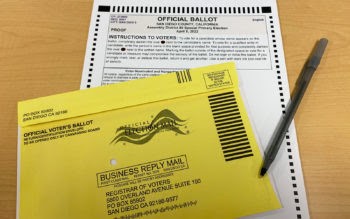(We Chinese in America Media Editor Tang Zhao, March 20, 2022) From County of San Diego Communications Office :If you live in the 80th Assembly District and want to vote in the April 5 Special Primary Election, you must register by Monday, March 21 to receive a ballot in the mail. Otherwise, you will need to make a trip in person to the Registrar’s office in Kearny Mesa or visit a vote center to conditionally register and vote provisionally through Election Day.
Only those who live in the state’s 80th Assembly District under the 2011 district boundaries can vote in the election. The district covers portions of southern San Diego County and includes parts of the cities of Chula Vista, National City and San Diego. If you’re not sure whether you were in the 2011 district boundary, you can look it up at sdvote.com.
Registering to vote is quick and easy and can be done online at sdvote.com. You will need to register to vote if you:
- are not registered in San Diego County
- recently moved
- changed your name
If your signature is confirmed through records at the California Department of Motor Vehicles, your registration will automatically be sent to the Registrar’s office. If your signature is not confirmed, you can print the form, sign it and return it to the Registrar’s office by 5 p.m. on March 21.
Registration forms must be postmarked or delivered to the Registrar’s office by March 21. Voters may also register online until midnight.
If you don’t have access to a computer, you may request a registration form. Call (858) 565-5800 or email 该Email地址已收到反垃圾邮件插件保护。要显示它您需要在浏览器中启用JavaScript。.
Not sure if you’re registered to vote? Check your registration status online at sdvote.com.
For voters who need language assistance, election materials are also available in Spanish, Filipino, Vietnamese, and Chinese.
Early voting is already underway at the Registrar’s office from 8 a.m. to 5 p.m. Monday through Friday. Some ballot drop box locations and the Registrar of Voters office will be closed on Thursday, March 31 in observance of Cesar Chavez Day.
You can also vote in person. Five vote centers will be open daily from 8 a.m. to 5 p.m. starting Saturday, March 26 until Election Day, Tuesday, April 5, when nine vote centers will be open from 7 a.m. to 8 p.m.
You can find a complete list of ballot drop box and vote center locations inside your voter information pamphlet or you can find a location near you using the locator map at sdvote.com.
This special election is to fill a vacancy in the 80th Assembly District for the remainder of the current term ending in December 2022. Even though recent redistricting changed assembly district borders, the boundaries used when the term began will determine who can vote to fill the seat to complete the term.
Learn more about voting in the 80th Assembly District Special Primary Election at sdvote.com, call (858) 565-5800 or toll free at (800) 696-0136.
Source: County of San Diego Communications Office
This website has a free subscription function, please enter your email address and name (any nickname) in the upper right corner of the page. After subscribing, you can receive timely updates of the website. I hope that new and old readers will actively subscribe, so that we have the opportunity to provide you with better services
Please click: Home (wechineseus.com) for more news and content on this website
Follow The Chinese Media's Twitter account: https://twitter.com/wechineseinus
Follow The Chinese Media's Facebook account: https://www.facebook.com/wechineseinamerica/
(We Chinese in America Media Editor Tang Zhao, March 19, 2022) Yachts moored in various ports by the rich Russians will be seized, but artworks temporarily stored in free ports are expected to escape. (Photo from Bloomberg)
At a time when countries around the world are trying to seize and freeze the assets of Russian oligarchs, the "free port" (free port) duty-free storage that these rich people often use to store valuables and works of art has not been searched in various countries, at least so far.
The warehouses, which are often located near railroads or airports, are not considered to be imported into the host country, subject to inspections or customs duties, Bloomberg reported. In the era when air travel became popular, some people needed to temporarily store items when transiting, and free ports came into being. As the art market has boomed over the past decade, catering to wealthy collectors seeking tax breaks when shipping art across borders, the number of free ports has exploded.
The country where the free port is located has its own regulations on these special areas, but there are still loopholes to be drilled.
For example, in Switzerland and the United States, items stored in free ports do not need to disclose the beneficial owner, that is, the ultimate physical owner of the item. This ultimate owner can be a holding company or other legal entity. In this way, a sanctioned individual remains the actual owner as long as he hides behind a shell company. While many shipping companies and Freeports require a driver’s license or passport from those authorized to move the artwork, those who come forward may be U.S. representatives of foreign companies controlled by sanctioned individuals.
Several experts have pointed out that Russian billionaires who already have art in the free port are likely to remain there after being placed on the sanctions list, rather than trying to transport it elsewhere or sell it. First, the haulage company and Freeport staff will not take the risk, and secondly, no one usually rushes to buy art from the sanctioned unless it is sold at a super low price.
However, the wealthy Russians who have not yet been included in the sanctions list but feel they are likely to be the next target, the free port should now be very attractive to them, if the art they own can be placed in a tax-free warehouse in an unrelated country, has a higher chance of being safe without damage.
(Source: Compiled from Online Information)
This website has a free subscription function, please enter your email address and name (any nickname) in the upper right corner of the page. After subscribing, you can receive timely updates of the website. I hope that new and old readers will actively subscribe, so that we have the opportunity to provide you with better services
Please click: Home (wechineseus.com) for more news and content on this website
Follow The Chinese Media's Twitter account: https://twitter.com/wechineseinus
Follow The Chinese Media's Facebook account: https://www.facebook.com/wechineseinamerica/
(We Chinese in America Media Editor Tang Zhao, March 17, 2022) Russian President Vladimir Putin claimed that he made only $140,000 a year, lived in an apartment that was only 800 square feet (about 22.5 ping), and declared a trailer and three cars. Yet some financial experts say he may actually be the richest man in the world. Or, if not the richest man, at least the second richest man. (Russian President Vladimir Putin may be the richest man on earth. Photo from Associated Press)
According to the Irish newspaper The Independent, if you look at Bloomberg's list of billionaires, as of March 12, the world's richest man was Tesla CEO Elon Musk, with a personal net worth of $2,060 billion, followed by Bezos with a net worth of $1,700 billion. After Russia invaded Ukraine, Musk, the world's richest man on the "table", actively assisted Ukraine with corporate resources such as his "Starlink" satellite communication equipment.
The US "Fortune" magazine (Fortune) once reported that Putin loves watches, likes to relax in a mansion worth 1.4 billion US dollars on the Black Sea, and has a collection of 58 planes and helicopters. One of them, the "Flying Kremlin", is worth $716 million, and there is also a toilet made of gold.
The richest man "under the table" once choked: "I have my private life, which is not allowed to be interfered with, and needs to be respected."
At a time when the Western world has slapped tough sanctions on Russia's wealthy and corporations, the focus is now on just how wealthy the strongman who waged the war against Ukraine is.
Putin portrays himself as a moderate, earnest civil servant who enjoys a simple, middle-class life, but is often spotted wearing high-end luxury watches. Judging from his photos, he wore a Patek Philippe Perpetual Calendar watch with a price tag of $60,000.
The $500,000 A. Lange & Sohne Toubograph and other uniquely designed models have also been featured in Putin.
The outside world also believes that a 190,000-square-foot (about 5,300 ping) villa overlooking the Black Sea belongs to him. It is said that this mansion will cost 2 million US dollars a year just to maintain the garden.
The Kremlin has denied Putin is the owner of the property, saying it is owned by a wealthy entrepreneur. Analysts, however, pointed out that no property of any businessperson would be guarded by the Russian Federal Security Service, and that the sky above is also a no-fly zone.
Putin also drove a $100 million superyacht to sea, and the Russian Navy nuclear submarine factory built the yacht for him.
The Irish newspaper The Independent said Putin's fortune was worth $2,000 billion, a figure financier Bill Browder put forward when he testified before the U.S. Senate Judiciary Committee in 2017. Browder believes Putin ordered Russia's oligarchs to hand over half of their wealth to him after the 2003 arrest of Mikhail Khodorkovsky, the founder of Yukos oil company, who was once Russia's richest man.
In this way, Putin’s net worth is a little worse than Musk’s, but the ceotodaymagazine website pointed out that Musk’s worth follows the stock market, so it fell below the $200 billion mark at the end of February. The reason is that the war between Russia and Ukraine caused the stock market to plummet. Musk's worth has since returned to more than $2,000 billion, and Putin's actual wealth is difficult to estimate, so it is not easy to determine who is the richest person on the face of the earth.
In any case, Putin should have already started to protect his assets. Last month, German media reported that Graceful, a superyacht believed to be owned by Putin, quietly sailed out of the Port of Hamburg before the scheduled maintenance was completed.
(Source: Compiled from Online Information)
This website has a free subscription function, please enter your email address and name (any nickname) in the upper right corner of the page. After subscribing, you can receive timely updates of the website. I hope that new and old readers will actively subscribe, so that we have the opportunity to provide you with better services
Please click: Home (wechineseus.com) for more news and content on this website
Follow The Chinese Media's Twitter account: https://twitter.com/wechineseinus
Follow The Chinese Media's Facebook account: https://www.facebook.com/wechineseinamerica/
(We Chinese in America Media Editor Tang Zhao, March 18, 2022) California plans to provide residents with gas tax rebate subsidies. (AAA)
The California Legislature plans to introduce a bill to provide a $400 gasoline tax rebate for each taxpayer in California to relieve the financial pressure on residents due to high oil prices. (California plans to provide residents with gas tax rebate subsidies. Photo from Triple A)
The $9 billion tax rebate program is funded by California's budget surplus, which was estimated at more than $45 billion at the beginning of the year. Lawmakers say the $400 rebate could help relieve California residents from paying gas taxes. The $400 petrol rebate will also be paid to taxpayers who do not own or drive a car.
After 11 years, California receives another 760 million special funds
Most of the legislators who proposed the proposal were Democrats. At the same time, according to the Los Angeles Times, some Republican lawmakers want to temporarily suspend the gasoline tax, but the move does not guarantee that oil companies will save money back to consumers, and the temporary suspension of the gasoline tax will also lead to a negative impact on the source of funding for major transportation projects.
Since Russia began its invasion of Ukraine, oil prices have continued to rise across the U.S., especially in California, where taxes are the highest. And high oil prices are not expected to abate anytime soon.
(Source: Compiled from Online Information)
This website has a free subscription function, please enter your email address and name (any nickname) in the upper right corner of the page. After subscribing, you can receive timely updates of the website. I hope that new and old readers will actively subscribe, so that we have the opportunity to provide you with better services
Please click: Home (wechineseus.com) for more news and content on this website
Follow The Chinese Media's Twitter account: https://twitter.com/wechineseinus
Follow The Chinese Media's Facebook account: https://www.facebook.com/wechineseinamerica/
(We Chinese in America Media Editor Tang Zhao, March 17, 2022) As a valuable service to We Chinese in America website readers, We Chinese in America website posts English and Chinese versions of “IRS News Release” and “IRS Fact Sheets” directly received from IRS Media Relations Office in Washington, D.C.. We are pleased to take on this important role partnering with IRS to better inform the public.
IR-2022-60, March 16, 2022
WASHINGTON - The Internal Revenue Service today urged people to stay resolute against ongoing scams and schemes by properly securing computers, tablets and phones. Solid cybersecurity protection and scam recognition is vital to reduce the threat of identity theft inside and outside the tax system.
The IRS works closely with the Security Summit, a partnership with state tax agencies and the private-sector tax industry, to help protect taxpayer information and defend against identity theft. Taxpayers and tax professionals can take steps to help in this effort by doing things like minimizing cybersecurity footprints and recognizing common scams and schemes.
Below are 10 tips to help minimize exposure to fraud and identity theft:
- Safeguard personal data. Provide a Social Security number, for example, only when necessary. Only offer personal information or conduct financial transactions on sites that have been verified as reputable, encrypted websites.
- Protect personal information. Treat personal information like cash – don't hand it out to just anyone. Social Security numbers, credit card numbers, bank and even utility account numbers can be used to help steal a person's money or open new accounts.
- Use strong passwords. Use a password phrase or series of words that will be easy for you to remember. Use at least 10 characters; 12 is ideal for most home users. Mix letters, numbers and special characters. Try to be unpredictable – don't use names, birthdates or common words. Don't use the same password for many accounts and avoid sharing them. Keep passwords in a secure place or use password management tools.
- Set password and encryption protections for wireless networks. If a home or business Wi-Fi is unsecured, it allows any computer within range to access the wireless network and potentially steal information from connected devices. Whenever it is an option for a password-protected account, users should also opt for a multi-factor authentication process. Multi-factor authentication is critical to protecting your password.
- Avoid phishing scams. The easiest way for criminals to steal sensitive data is simply to ask for it. IRS urges people to learn to recognize phishing emails, calls or texts that pose as familiar organizations such as banks, credit card companies or even the IRS. Keep sensitive data safe and:
- Be aware that an unsolicited email with a request to download an attachment or click on a URL could appear to come from someone that you know like a friend, work colleague or tax professional if their email has been spoofed or compromised.
- Don't assume internet advertisements, pop-up ads or emails are from reputable companies. If an ad or offer looks too good to be true, take a moment to check out the company behind it.
- Never download "security" software from a pop-up ad. A pervasive ploy is a pop-up ad that indicates it has detected a virus on the computer. The download most likely will install some type of malware. Reputable security software companies do not advertise in this manner.
- Use security software. An anti-virus program should provide protection from viruses, Trojans, spyware and adware. The IRS urges everyone to use an anti-virus program and always keep it up to date. Set security software to update automatically so it can be updated as threats emerge.
- Educate those less experienced about online safety. Children and those with less online experience may not be fully aware of the perils of opening suspicious web pages, emails or documents. Teens and younger users can put themselves at risk by leaving a trail of personal information for con artists to follow.
- Back up files. No system is completely secure. Copy important files, including federal and state tax returns, onto removable discs or back-up drives and cloud storage. Store discs, drives and any paper copies in secure, locked locations.
- Know the risk of public Wi-Fi. Connection to public Wi-Fi is convenient and often free, but it may not be safe. Hackers and cybercriminals can easily steal personal information from these networks. Always use a virtual private network when connecting to public Wi-Fi.
- Review ID Theft Central. Designed to improve online access to information on identity theft, it serves taxpayers, tax professionals and businesses.
The IRS doesn't initiate contact with taxpayers by email, text messages or social media channels to request personal or financial information. Generally, the IRS first mails a paper bill to a person who owes taxes. In some special situations, the IRS will call or come to a home or business.
People should be alert to scammers posing as the IRS to steal personal information. There are ways to know if it's really the IRS calling or knocking on someone's door.
Taxpayers can find answers to questions, forms and instructions and easy-to-use tools online at IRS.gov. They can use these resources to get help when it's needed at home, at work or on the go.
This news release is part of a series called the Tax Time Guide, a resource to help taxpayers file an accurate tax return. Additional help is available in Publication 17, Your Federal Income Tax.
Source: IRS News Release















